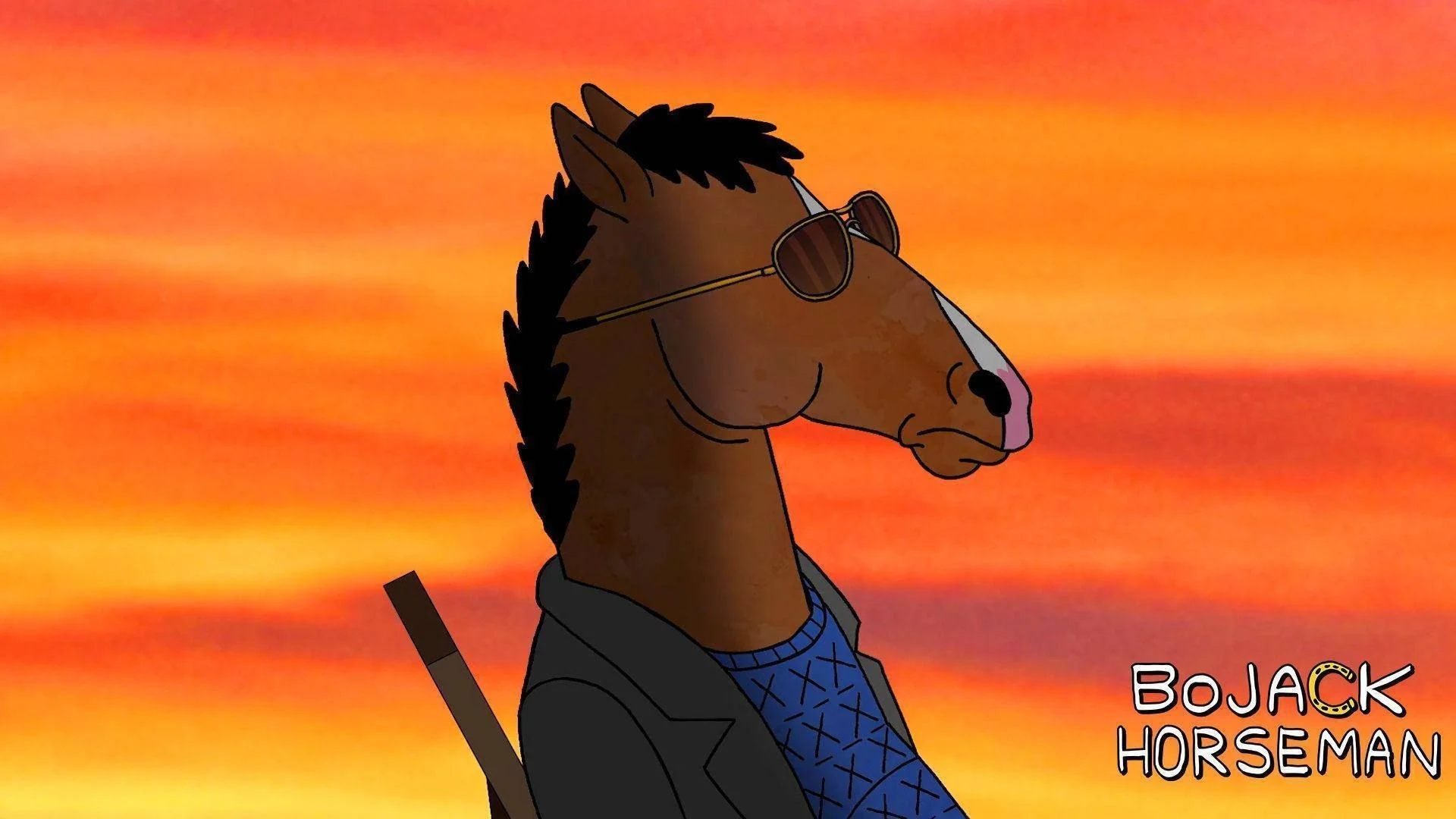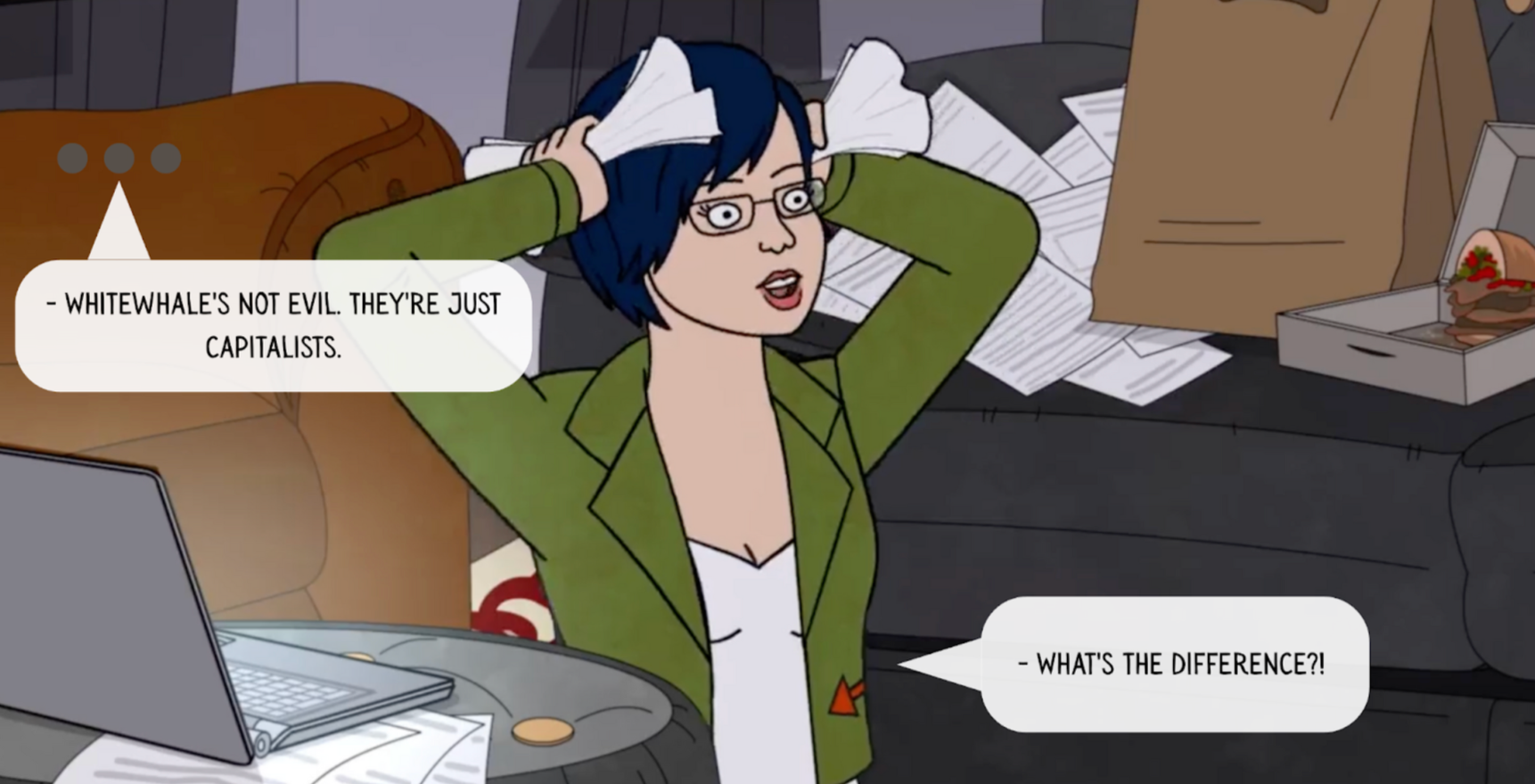How does the TV show “Bojack Horseman” portray capitalism in our society? (Part 2)
Diane in “Bojack Horseman” serves as an example of someone who advocates for conscious capitalism. The term refers to a business philosophy that emphasises ethical operation and focuses on a purpose beyond pure profits. When working for Girl Croosh magazine, Diane initially wants to write meaningful stories but realizes that sensationalized content generates more traffic.
Season 6 Episode 3 “Feel-good Story” directly describes what kind of articles the journal is expecting its writers to produce. Diane is shown to be highly invested in addressing local issues, such as resort pools being contaminated, jewellery shops selling products that irritate the skin, and problems with water filtration in lower-income areas.
However, Stefani, the director of the journal, requests something in opposition to “exposition of the ugly underbelly of American Capitalism”, exposing the corporate pursuit of profit-maximisation over ethical storytelling.
The controversy of Fracking was fiercely addressed by Diane in Season 4 Episode 4. Being a highly dangerous practice, it is depicted as a destructive force, symbolizing how capitalism exploits natural resources with little regard for long-term consequences. The episode critiques the way industries extract resources aggressively, mirroring real-life corporate practices that prioritize short-term profit over sustainability.
Despite showing Diane as a person who is not afraid to speak up against such unethical practices, in Season 5, she is consumed by the need to capitalize on her trauma in order to be worthy of her experiences. She is convinced that if her suffering can be turned into a well-received book, then it will have a meaning. This once again reflects how capitalism commodifies pain and personal struggle, turning trauma into a product to be consumed in exchange for its monetary value.
Overall, it can be said that the character of Diane portrays how capitalism pushes well-intentioned people to prioritize profitability and seek personal validation of its success.
HOORAY! A TODD PARAGRAPH!
From the beginning of the show, Todd is portrayed as a quintessential careless dreamer—an optimistic, creative, exaggeratedly naive person navigating between his overly high ambitions and absolute aimlessness. Todd is marginalised and considered an outcast in society because he has not contributed to the employment force and has not been able to provide himself with basic economic needs, such as shelter or food, as he is always reliant on his friend BoJack. In a capitalistic society, his worth is measured by how much he can contribute to the free market and how much money he makes. By enjoying various benefits without working, his character represents the Free Rider Problem, which is largely criticized by capitalists.
Throughout the show, we witness Todd attempting to succeed in many endeavors, entrepreneurial or otherwise, and negatively reacting to their ultimate failure: Clown dentistry, an amusement park, taxis with female drivers, etc. However, in Season 6, he pitches the idea of a Daycare for the employees that work at Princess Carolyn's management company, VIM, an idea that she welcomes. In the finale, it's confirmed that Todd is still the head of the daycare, and looking after the babies whom he refers to as ‘his work associates’, and it's clear that it's something he enjoys doing. The character of Todd does not showcase himself as a runner of another profit-generating enterprise, but instead refuses to let success validate him in the society he lives in, proving that personal fulfillment can exist outside capitalism’s constraints of profit and productivity.
NEFLIX’S “BOJACK HORSEMAN”
It can be argued that the series itself serves as an illustration of the detrimental effects of capitalism on the entertainment industry. The show openly portrays the sensitive topics of alcoholism and substance abuse, which could be an attempt to fetishise them for the audience’s appeal. This point aligns with the broader unhealthy capitalist tendency to commodify every aspect of human existence, including the mental health issues faced by BoJack and the other characters.
The main characters, such as BoJack, Princess Caroline, Diane, and Sara Lynn, are often seen in a state of alcohol intoxication as a way of depicting their desire for escapism and idealization of the image of “freedom”. For example, when BoJack comes to Sara Lynn to “party” after the unfortunate outcome of the Oscar nominations ceremony, the co-stars decide to “do something fun” and Sara Lynn suggests to “get crazy high in the parking lot, then go in [a planetarium] and get your mind blown”. BoJack’s sarcastic quips about needing alcohol to function and scenes of him casually drinking at all hours can be seen as an act of normalization of such topics through humour, subtly linking it to capitalism’s tendency to encourage instant gratification.
CONCLUSION
Whether “Bojack Horseman” is a contemporary critique of capitalism, a mere side-effect of political debate on social media, or a byproduct of the very system it condemns, it is undeniably a one-of-a-kind experience for any viewer. It is rare when a comedic cartoon show so successfully raises awareness of the deep-rooted flaws of whole countries' economies and our society, forcing its audience to question the structures they live within, leaving a lasting impact long after the final credits roll. The show, however, does not answer our questions and concerns about the capitalist subject, but perhaps that was the point. The series finale, in which Bojack shares a few minutes of on-screen silence with Diane, is an answer in itself.
Article written by Darina Iminova | Proofread by Zhangir Zhangaskin


